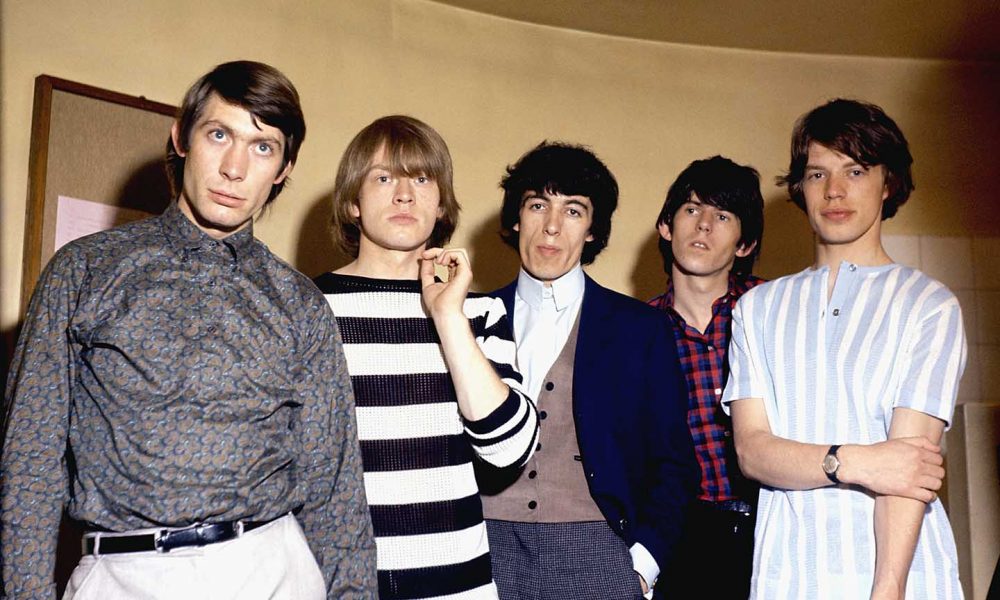‘As Tears Go By’: The Story Behind The Rolling Stones Song
Poignant and pensive, the sorrowful symphony was everything the Stones weren’t, yet signaled the beginning of a new, experimental journey.

Coming after the deft one-two punch of “(I Can’t Get No) Satisfaction” and “Get Off Of My Cloud,” The Rolling Stones’ choice for their next single in late 1965 – “As Tears Go By” – was not only a curveball, but one that marked a significant new chapter in the group’s artistic evolution.
“We just don’t know the direction we’re moving in,” Mick Jagger said around the time. “I don’t think anyone knows. Who can ever say how they’re progressing? We’ve evolved a policy of letting things happen to us. We don’t plan the future or try to mold the group in patterns. We always try to progress and improve, but it’s never a planned campaign.”
Listen to The Rolling Stones’ “As Tears Go By” now.
What nobody expected from the now-notorious group of badly behaved blues enthusiasts was what they got next: a ballad. The bittersweet, strings-laden pop landscape of “As Tears Go By” was a far cry from the twin guitar grooves the band had thus far crafted. In its sweeping sentimentality and lush instrumentation, “As Tears Go By” – the first original composition by Jagger and guitarist Keith Richards – opened a new era for The Rolling Stones, one in which they’d further experiment with sounds and styles and firmly define themselves as rock and roll innovators.
The context
The big difference between Britain’s two biggest groups in the early 1960s was original material. The Beatles, thanks to John Lennon and Paul McCartney’s prolific songwriting partnership, were thriving with an abundance of self-penned songs. The Rolling Stones, meanwhile, having not yet sharpened their own compositional skills, were beginning to run out of obscure blues tracks to cover.
It was the Stones’ manager Andrew Loog Oldham who recognized this fatal flaw in the group’s fortunes – above all else, they were missing out on the publishing royalties that songwriters receive – and so set to rectifying the situation immediately. In Jagger and Richards’ shared commitments and chemistry he saw the promise of a prosperous pairing, and after some early attempts of collaboration, Oldham went to extreme measures to ensure their union would yield better results. One day in early 1964, he locked the pair in the kitchen of their Willesden flat, telling them they’d be released once they’d written a song.
“My first reaction,” Keith later recounted, “was, ‘Who do you think I am, John Lennon?’ At that time, for me, songwriting was somebody else’s job. My job was to play guitar and that’s what I wanted to do. I didn’t think I’d be a songwriter any more than I’d be a nuclear physicist on the side. It was a different area of operation. But Andrew showed me, and what I firmly believe is if you can play an instrument you can write a song. Andrew presented the idea to us, not on any artistic level, but more money. That was the pressure of business. That was a very astute observation of Andrew’s. It was very obvious once he put it to us.”
They emerged with “As Time Goes By” (as it was originally titled), an acoustic number whose melancholic mood was a distinct departure from the Stones’ usual insolence. Oldham’s directives for the pair to not come out with a blues song, or a copy of an old favorite, had produced something entirely new. Unfortunately, neither Mick or Keith felt like the song was suitable for the Stones – the latter calling it “a terrible piece of tripe” – and it would be another eight months before they’d present with confidence a song they’d written (“The Last Time”) to the band.
The Marianne Faithfull version
In the meantime, Oldham had his own plans for “As Time Goes By.” That March, he’d met a 17-year-old former convent girl named Marianne Faithfull at a party. Struck by her enchanting looks, he’d immediately suggested he make a record with her. Marianne had thought the Stones “crass and boorish,” but was intrigued enough by Oldham to proceed with his plans. It has been suggested that it was with Marianne in mind that Oldham had entrapped Jagger and Richards, hence the resulting song’s wistful qualities.
“[It] was like a Françoise Hardy song, really,” Marianne would recall. “Maybe that’s what Mick picked up from me when we met. Slightly existential, but with a dash of San Remo Festival – the Europop you might hear on a French jukebox. Or, rather, it’s what Andrew saw in me at the party and told Mick to write.”
Mere weeks later, Marianne was in the studio with Oldham, Jagger, and Richards, ready to record the song, which had recently undergone some revisions. Oldham, unhappy with some of Mick’s “soppy” lyrics, edited the words to his liking, thus changing the title to “As Tears Go By” to disassociate it from Dooley Wilson’s “As Time Goes By,” which appeared in the movie Casablanca, receiving a songwriting credit in the process.
Marianne Faithfull’s version of “As Tears Go By” became her debut single, launching what would become a long and distinguished career with a No.9 placing in the UK charts. By early 1966, her relationship with Mick Jagger turned from professional to personal, and they remained an exquisite, decade-defining couple until 1970.
The Rolling Stones version of “As Tears Go By”
As The Rolling Stones endured a hectic touring schedule throughout 1965, recording sessions became increasingly more difficult to arrange. This would, in part, explain why December’s Children (And Everybody’s), their fifth US album, released that December, was made up of songs left over from disparate sessions over the last year; an “album of rejects,” as guitarist Brian Jones put it.
But it was on this record that fans would first hear the Stones’ take on “As Tears Go By.” They had recorded it a year after Marianne, opting to adjust the song’s arrangement and instrumentation. Notably, neither Brian Jones, bassist Bill Wyman, nor drummer Charlie Watts appear on the song. Instead, the glorious symphonic orchestrations of Mike Leander (later to score for The Beatles) provide the ornate backing behind Mick’s voice and Keith’s guitar.
Standing out among its parent album’s rockers, “As Tears Go By” was a surprisingly tender offering from the Stones. Jagger’s voice, honeyed and sincere, tells a story of lost innocence: “It is the evening of the day,” he sings. “I sit and watch the children play / Smiling faces I can see / But not for me.”
“It’s a very melancholy song for a 21-year-old to write,” Jagger conceded in the 90s. “The evening of the day, watching children play – it’s very dumb and naive, but it’s got a very sad sort of thing about it, almost like an older person might write. You know, it’s like a metaphor for being old: You’re watching children playing and realizing you’re not a child. It’s a relatively mature song considering the rest of the output at the time.”
The song’s emotive appeal was identified by American disc jockeys, who’d played it on the radio as an album highlight. This led the Stones’ US label to release “As Tears Go By” as the group’s Christmas single, and while it missed the top of the Billboard Hot 100 chart (only reaching No.6), its appearance on the Easy Listening chart was indicative of the Stones’ widening influence.
In Britain, however, the Stones decided to relegate “As Tears Go By” to the B-side of their February 1966 single, “19th Nervous Breakdown.” Similar to the fate of “Yesterday” when The Beatles felt the song didn’t suit their image, the Stones elected to lead the release with their faster, more characteristically acerbic new number.
Nevertheless, the impact of “As Tears Go By” was greatly felt. In its flourishing, romanticized English style, the song seemed to preface the expressive and beatific sound that would fully blossom through the prism of psychedelia in 1967. “That music,” said Charlie Watts of the song, “was the very, very beginning of flower power.”
From here, rock and roll in the hands of the Stones would become something decidedly more exciting. Brian Jones, especially, would revel in their studio experimentation, rejecting his guitar in favor of more exotic instruments with which to create vivid new textures and layers in the Stones’ sound. For Jagger, too, “As Tears Go By” was a symbolic turning point.
““As Tears Go By” is the moment it all begins,” remarked author Mark Spitz, “a point of serendipity, the instant the Stones delineated themselves not just songwriters, not merely rebels but romantic figures, never again to be easily dismissed as thugs. Here, Mick Jagger, already a sex object, became a poet.”
The song’s legacy
For Marianne Faithfull, “As Tears Go By” remains a calling card. She’d revisit the song in 1987 and again in 2018, each of the re-recordings evoking a profound reflection of the artist in those periods of her hard-lived life, graphic considerations of the ravages of time.
For the Stones, it loomed considerably less in their legacy. Though they played it live on their third appearance on The Ed Sullivan Show in February 1966 (their first in color), it was never to be performed on stage again until their Bigger Bang Tour in 2005.
“As Tears Go By,” however, is not without its admirers. Damon Albarn sampled the track for his The Good, The Bad And The Queen project in 2007, while in 2013, none other than Taylor Swift took to the stage in Chicago to duet with Mick as the Stones dusted down their lost classic.
Fleetwood Mac’s Lindsey Buckingham, too, has been vocal about his affection for the song. “I always loved that Mick could write something as sensitive as ‘As Tears Goes By,’” he once enthused. “It always blew my mind that he had that streak in him, underneath all that other stuff.”















Edward
September 16, 2023 at 6:51 pm
It would have been better to use the word ‘years’ and not ‘tears’ because tears has no context in the song but the passing of time is very evident in the lyrics. The song would better carry the feeling of reminiscence (with ‘years’) rather than an unidentifiable ‘remorse’ (with ‘tears’). A lovely melody though!
ela
March 24, 2024 at 8:40 pm
With nearly sixty years of hindsight, there is a strong emotional similarity with “Yesterday,” Paul McCartney’s plaintive minor ballad that eclipsed this song over the decades – but I remember the far stronger visceral emotional truth to Marianne Faithfull’s original when it first came out, ahead of both the Jagger and McCartney recordings. The minor tone, with just the briefest attempt to rise above the despair (smiling faces I can see), only to fall back down (but not for me), in the barest of lyrics, feels more genuinely resigned to a bleak fate. The strings come in, just as in “Yesterday,” and I believe if the same singer had recorded one then the other, critics would have said they were just rehashing their first hit.
No plagiarism is involved, because the mood and tone of songs can’t be copywritten, just strings of notes or lyrics. In the end, either song still feels more stripped down and “authentic” than most over-produced, complicated, yet lyrically generic and clonal modern attempts that feel AI generated.